Aamar Bond not IFIC’s
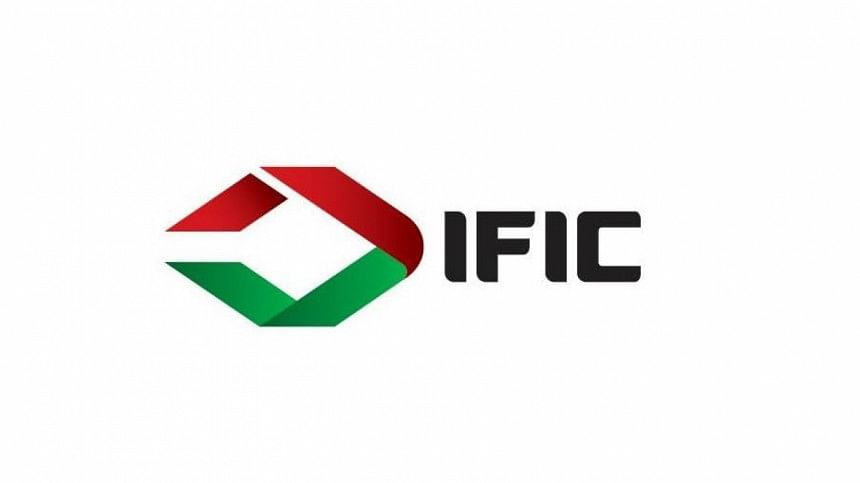
A real estate company has issued bonds by offering eye-popping returns to raise funds for a gigantic housing project in Gazipur, a normal development on the surface. However, the way the Tk 1,000 crore bonds have been presented to prospective investors has raised questions, because it looks as if a private commercial bank has rolled out the financial instrument, and not the realtor.
What is more, the possibility of a conflict of interest has surfaced since an influential businessman, Salman F Rahman, and his son Ahmed Shayan Fazlur Rahman, are partners of the realtor as well as shareholders of the bank.
All of these came together to create a dizzying investment avenue for risk-takers, and it could pose a graver risk to the bank that is owned mostly by the government and retail investors than to Salman and his son.
IFIC Bank PLC, the private bank in question, has recently announced the completion of the subscription of the five-year IFIC Aamar Bond, meaning all the bonds worth Tk 1,000 crore have already been sold in just over a month.
The bonds will yield an annual 12 percent interest rate, popularly called discount rate, which is higher than the interest rate offered by the government for investments in the national savings certificates, the deposit rates at banks, and other corporate bonds.
The bonds were not issued by IFIC Bank, but by Sreepur Township Ltd (STL), a newly-formed real estate company.
IFIC is giving a guarantee although STL was set up in March this year and has no experience in constructing any flats or developing any plots, let alone building a township.
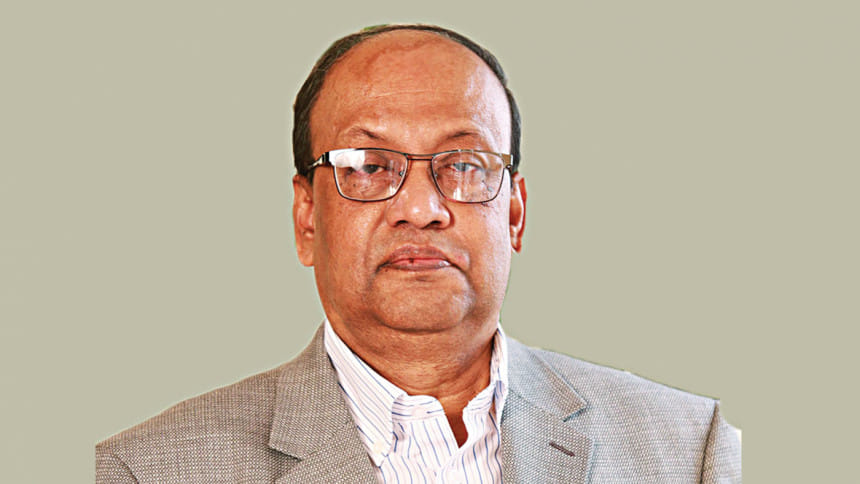
"It's nothing but a complete financial engineering to raise funds…. I don't know how the BSEC has approved the bond that is huge in size."
One of the concerns is that no zero-coupon bond issuers have ever sought a guarantee from any bank in Bangladesh to raise funds. In fact, taking the guarantee is not required as per debt securities rules, and it entails extra costs.
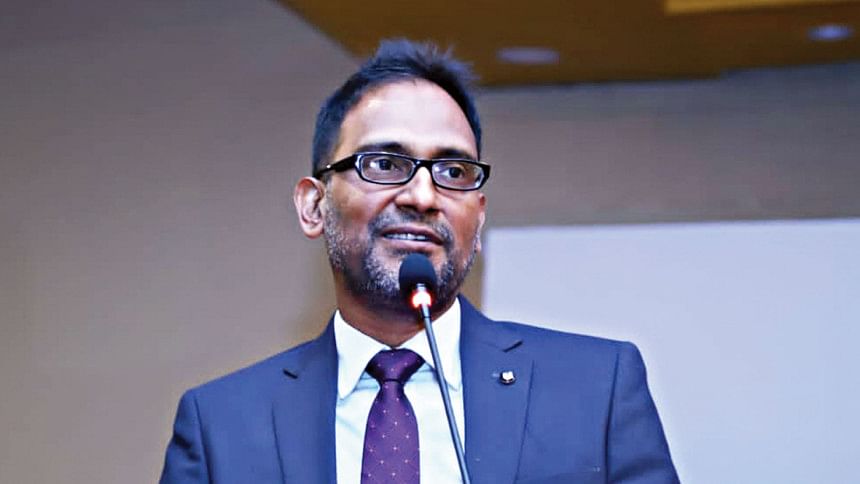
A bank has no right to do it because depositors keep funds mainly to safeguard their savings. The Bangladesh Bank and the BSEC have a duty to check whether any bank is putting its savers at stake.
A top official of the Bangladesh Securities and Exchange Commission (BSEC), seeking to remain unnamed, said the regulator considered the bonds to be at "high risks of default", so it verbally suggested that STL secure a guarantor to protect the interest of general investors.
A top official of a private bank said he would never have given the guarantee using public money to such a company if he was the top executive of IFIC.
According to him, STL obtained the guarantee to use the goodwill of the bank and assure people that it would not default on the payments.
CAN STL USE THE NAME OF IFIC?
STL is using the name 'IFIC Aamar Bond' in public communication, which immediately gives an impression to an unsuspecting common investor that the bonds are issued by the private bank.
This is because while IFIC's name is visible conspicuously, the name of STL comes in a much smaller font in the newspaper advertisements. Sometimes, the real name of the bond -- IFIC Guaranteed Sreepur Township Green Zero Coupon Bond -- is not cited at all.
A former banker said the name of the bond cannot be "IFIC Aamar Bond" because the issuer's name is hidden here.
"The name of the bond is clearly misleading," he said.
The bank is allowing its brand image to be used by a new firm because the architect of the bond knows that investors will not extend their money if they know the issuer's name, the banker said.
"This type of trickery is rare in the banking sector. The central bank should ask IFIC Bank to explain how it allowed its name to be used in such a manner."
A lawyer, who deals with corporate cases, said the name of the bonds misrepresents its real name and the name of the real issuer. "The inclusion of the word "Aamar" in the bond's name is also another example of misinformation since it is not part of the original name."
This has confused many.
Razu Ahmed, who is involved in the trading business, was planning to buy the bond after seeing several advertisements in newspapers. He had thought that IFIC was raising the funds by offering a higher interest rate.
At least 10 investors have echoed the same sentiment.
None of them eventually bought any bonds after learning about the perceived trickery.
CONFLICT OF INTEREST
The bond documents show that STL has onboarded Beximco Ltd in the project. Beximco Ltd and SFR Real Estate Ltd have collectively contributed 25 acres of land to form a joint venture on revenue-sharing basis with STL.
STL plans to appoint Beximco Engineering Ltd for detailed engineering, procurement, construction and related services for the delivery of the scheme.
The owners from Beximco Ltd are Salman F Rahman and his son Ahmed Shayan Fazlur Rahman, respectively vice-chairman and adviser of the industrial behemoth.
Both sit on the board of IFIC Bank as well: Salman is the chairman and Shayan is the vice-chairman.
IFIC's guarantee to the bond shows that both have an interest in STL because of their shareholding in Beximco. No information is publicly available about SFR Real Estate.
"The projected cash flow [of STL] is adequate to cover the repayment."
This ultimately indicates that IFIC is giving a guarantee to the project for the benefit of its two directors and taking risks as it will have to repay the money along with the interest in case STL fails to pay.
As of October 31, owners held only a 6.14 percent stake in IFIC Bank, while the government owns 32.75 percent, institutions 20.83 percent, and retail shareholders 39.16 percent, according to data from the Dhaka Stock Exchange.
Despite knowing all these, the BSEC gave its consent to the bond.
A top banker sees it as a conflict of interest as the bank has extended the guarantee to a realtor where its directors' company has a partnership.
"This is a clear compromise when it comes to corporate governance," he said.
A corporate lawyer echoed the banker, saying this is a governance issue.
The Bangladesh Bank has, however, kept its responsibility limited to just seeking an explanation from IFIC although the government as well as the depositors' funds are at stake.
Faruq Ahmad Siddiqi, a former chairman of the BSEC, said STL started its business just a few months ago and is not generating any revenue.
"How will it return people's funds from the very beginning?"
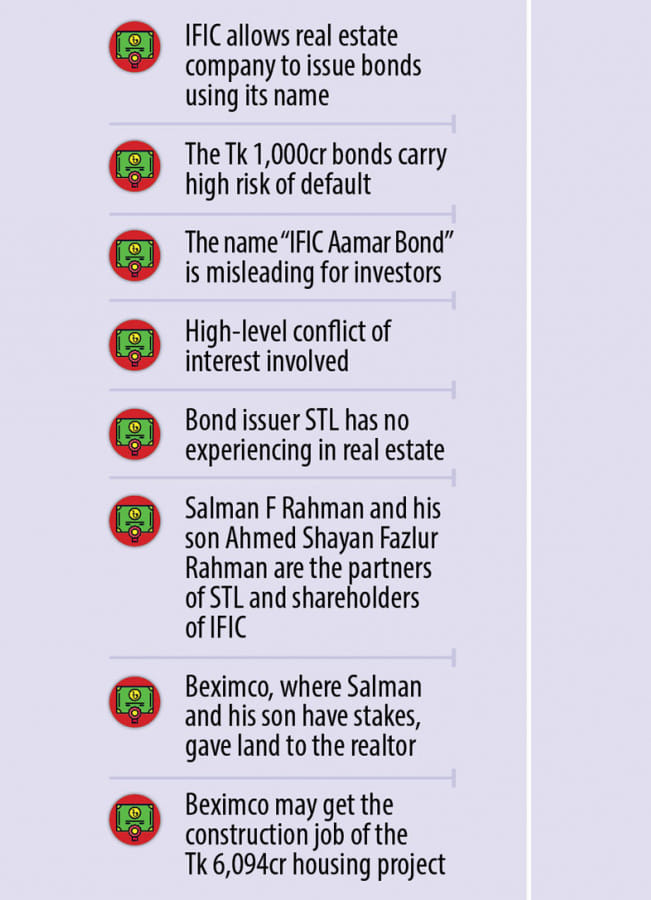
If an investor buys bonds worth Tk 100,000, he will get Tk 1,000 per month in interest in the following 60 months. At maturity, he will get back the principal amount. "It's nothing but a complete financial engineering to raise funds," he said.
Faruq Ahmad termed the venture also risky. "I don't know how the BSEC has approved the bond that is huge in size."
According to the Debt Securities Rules of 2021, an issuer can make an application to the commission for the issuance of debt securities if it has a good track record of profitability and liquidity generated from net operating cash flows.
If the issue is to support a new or greenfield project, its forecasted financial position shall indicate significant profitability, liquidity, and ability to pay back by generating sufficient net operating cash flows.
STL has shared a projection, but several financial market stakeholders have expressed doubt over the forecasted revenue stream.
A top official of a merchant bank, who has vast experience in managing the issuance of bonds, said it is clearly a related party transaction as IFIC's directors' company has a partnership with STL.
He said it is not difficult to raise funds by issuing bonds because issuers do not have to be profitable companies. Moreover, it is a comparatively new instrument in Bangladesh, so it is easy to attract people by giving a lucrative rate.
After poring over the documents related to the bond, he said the approval for this type of financial instrument is only possible if there is a political pressure.
The BSEC, however, said it went by the book.
DEVIATION IN BONDS' NATURE
A zero-coupon bond is a debt instrument, which is used by a company to take loans from investors. It does not pay monthly interest. Rather, it offers a deep discount at face value, rendering profit at maturity, when the bond is redeemed.
Generally, an issuer of a zero-coupon bond repays annually or after maturity. By offering the monthly interest or coupon, the issuer is deviating from the zero-coupon bonds' nature.
THE TOWNSHIP PROJECT
STL said it will establish a township in Chhoto Gobindpur, Gazipur, an industrial district adjacent to Dhaka, on 76 lakh square feet of area.
There will be high-rise commercial spaces and 23 lakh square feet of residential facilities on a 37-acre site. The cost of the project is Tk 6,094 crore, according to STL estimates. It will be built over the next five years.
Of the Tk 6,094 crore, Tk 335 crore will come from equity, Tk 1,000 crore from the bond, Tk 1,185 crore from the land owner, and Tk 3,574 crore from the advance of customers.
The company expects to generate revenues of Tk 6,585 crore from the sale of properties.
Documents show STL received the nod of the bond on July 12 from the BSEC on the basis of a financial report for just 23 days of April 2023.
During the period, the company earned no revenues. Rather, it incurred a loss of Tk 17.9 lakh. Its assets amounted to Tk 334 crore, according to the financial statements.
The approval came in just three months.
A former Bangladesh Bank governor termed the BSEC approval "unusual" given the company's financial health and the fast-track approval process.
Md Mashiuzzaman, managing director of STL, and Tilat Shahrin, director of the company, jointly hold a 100 percent stake. The documents gave no further details about the two. No information about them was also available on the website of STL.
STL said its project is located in Gazipur-Savar area, home to hundreds of factories. So, there is a demand for office spaces, hotels, and other amenities.
To hit the sales target for flats and commercial spaces, marketing campaigns have been worked out to create a buzz and attract potential buyers. Partnerships with banks have been planned to facilitate the financing for the potential buyers, STL's Chief Financial Officer Abdul Jabbar told The Daily Star in an email.
"Being the maiden venture in the planned area, we are not even contemplating that any flats or commercial space will remain unsold.
"Rather, we have envisioned that once we finish the first project, we may go for similar projects for low and middle-income groups in the area," he said.
A top executive of a real estate company, however, said the real estate sector is passing a challenging period due to current macroeconomic challenges. "The STL project is huge and it may not be easy to reach the sales target in five years."
Nationwide flat sales stood at 10,000 in 2022-23, down from 12,000 in the previous financial year. Annual sales averaged 14,000 from 2017 to 2020, according to the Real Estate & Housing Association of Bangladesh.
IFIC did not reply to queries despite repeated attempts. Beximco replied and IFIC's Company Secretary Mokammel Hoque said, "Beximco's statement is IFIC's statement."
In its reply, Beximco said the area is suitable for affordable housing which has a great demand, as the project is adjacent to Dhaka and is accessible.
It said it is completely incorrect to suggest IFIC decided to guarantee STL in order to benefit the directors of the bank.
The company added that STL's paid-up capital is more than sufficient to cover the equity participation against a non-funded exposure of Tk 1,000 crore.
STL has an authorised capital of Tk 500 crore and a paid-up capital of Tk 335 crore as of April 30, 2023.
"The projected cash flow is adequate to cover the repayment," Beximco said.
According to Beximco, the non-funded facility is adequately covered by a collateral of 37 acres of land. "This is an additional security to the bank above the equity participation by the borrower."
After exploring all these, Beximco Group has decided to join this venture and the IFIC board decided to extend the guarantee considering the business potential and benefit to the bank and its depositors, it added.
WHAT REGULATORS SAY
BSEC Spokesperson Mohammad Rezaul Karim said though the issuer company is new, its equity is not small. He said the BSEC approved the bond as the bank had given the guarantee.
"This type of trickery is rare in the banking sector. The central bank should ask IFIC Bank to explain how it allowed its name to be used in such a manner."
"Since STL is a new company, it will need time to generate revenue, so a bank will pay on behalf of the company first and the lender will take it from the company later," he said.
"So, investors have a very minimum risk. To protect investors, the provision of the corporate guarantee has been included. Whatever risk is there, it is on the bank's side -- bond investors will not feel it."
The bank gave the guarantee by analysing the potential of the company, Rezaul said, adding STL received the approval as per debt securities rules. "We are hopeful that the company will not default."
He also said this type of related party transaction from the point of view of the bank is allowed.
Contacted, Bangladesh Bank Spokesperson Md Mezbaul Haque said IFIC Bank did not seek any permission from the central bank since it is not the issuer of the bond. He declined to make any further comments.
A top official of the central bank said the BB was concerned when it saw that the issuer used IFIC's name in the bond, making it look as if the bonds were issued by the bank.
"Since STL is a new company, it will need time to generate revenue, so a bank will pay on behalf of the company first and the lender will take it from the company later."
He describes IFIC's guarantee as risky, saying it will be difficult to generate the projected income and build the township in the next five years.
The central bank has already sought explanations from the private bank several times but it is yet to receive one, he added.
ANALYSTS WORRIED
A former governor of the central bank questioned how the board of directors of IFIC allowed such a big amount of guarantee in favour of a new realtor.
"It is clear that the bank has taken a mammoth risk at the expense of the safety of the funds of depositors.
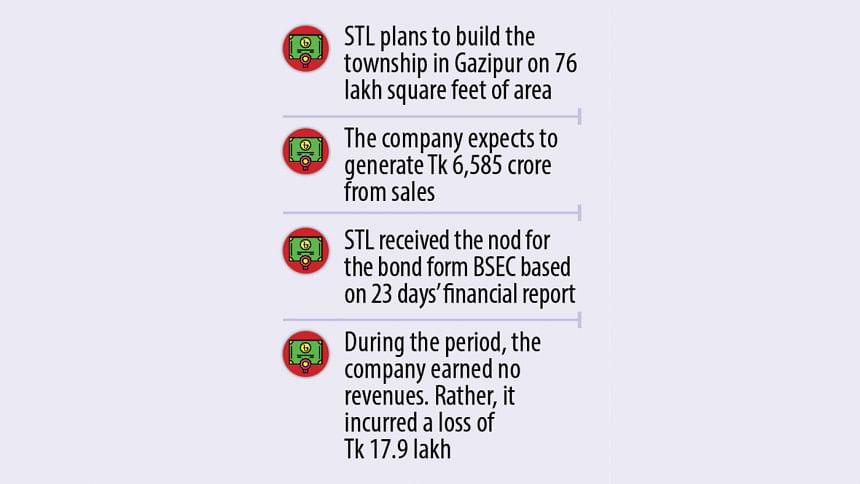
"A bank has no right to do it because depositors keep funds mainly to safeguard their savings. The Bangladesh Bank and the BSEC have a duty to check whether any bank is putting its savers at stake," he said.
The former BB chief said regulators have become ineffective in reining in banks from engaging in risky businesses. "The bank has independent directors and directors from the government side. What did they do?"
He also observed that IFIC gave the guarantee to extend benefits to the people who are behind STL.
Former BSEC Chairman Siddiqi thinks the BSEC should have examined the bond issue closely. "In my opinion, it was a premature approval."
The merchant banker said the regulator should not allow anyone to misuse the bond.
"It should investigate whether the issuer is really capable of returning investors' funds. The regulator can still save investors by putting the fund on hold and examining the project's viability."

 For all latest news, follow The Daily Star's Google News channel.
For all latest news, follow The Daily Star's Google News channel. 








Comments